This post may contain affiliate links. Read my full disclosure policy.
How to make Authentic Masala Chai, using whole spices, black tea and your choice of milk. A cozy comforting mug of goodness. Vegan-adaptable. Serve this with Spicy Chai Molasses Cookies!
Love Indian Food? Check out 35+ Mouthwatering Indian Recipes to Make at Home!
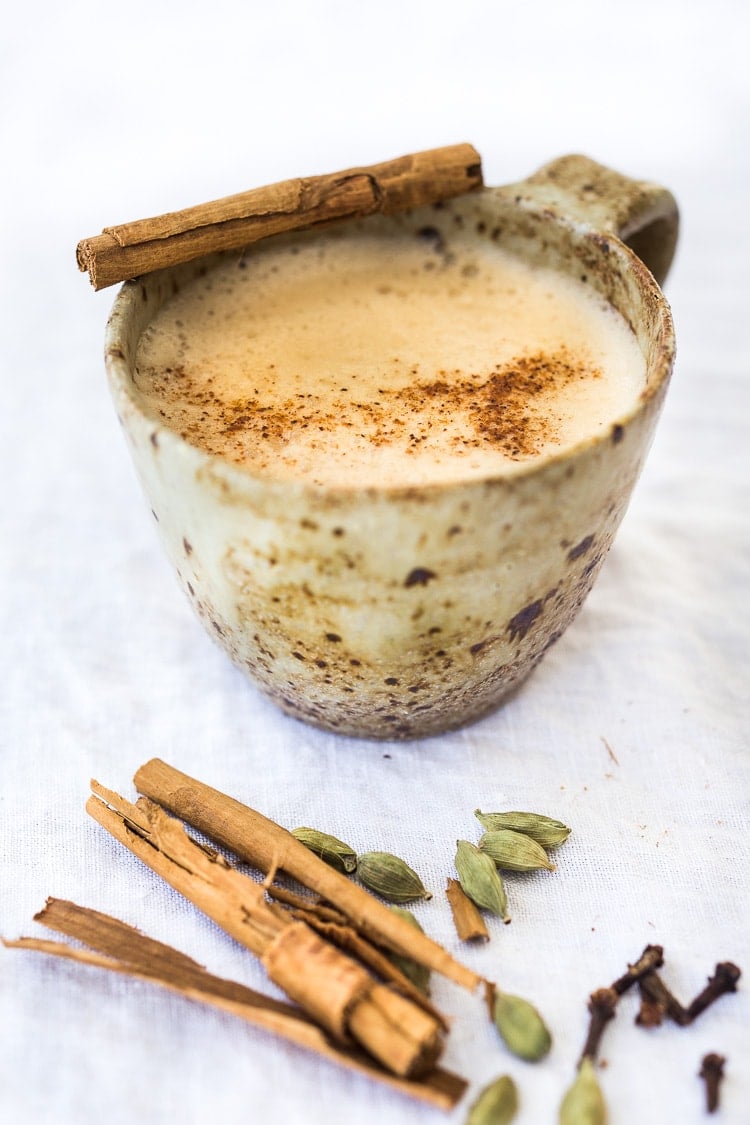 Many thoughts appear in the mind, but it is the heart that holds one and not another. ~Dorothy Hunt
Many thoughts appear in the mind, but it is the heart that holds one and not another. ~Dorothy Hunt
Call me a late bloomer, but it wasn’t until I went to India and experienced Chai firsthand that I fell in love with it. Now, there’s not a day that goes by that I don’t either make myself a cup, or pine for it.
Yes, I’ve had it numerous times here in the states, but somehow, either it was overly sweetened, too bland, or perhaps I had just never truly “connected” with it. It was almost like I met Chai for the first time at age 50 when I went to India. I can’t believe I lived so many years without it!
Masala Chai filled a void I never knew I had until those very first sips. ☕️
Here is a video of my favorite Chai Wallah at work- in a small village in Rajasthan, India. (Shot on my iPhone)
Authentic Masala Chai in India | 30-sec video
What is Masala Chai?
In India, masala means spice, and chai means tea. Spiced Tea. And that is exactly what Masala Chai is -black tea infused with fragrant spices, typically served with milk.
Here in the states, we often call this “chai tea”, or a chai tea latte. But in India, saying “chai tea”, is like saying “tea tea”. So that’s why in India, one says Masala Chai – or spiced tea.
Good to know, right? 😉
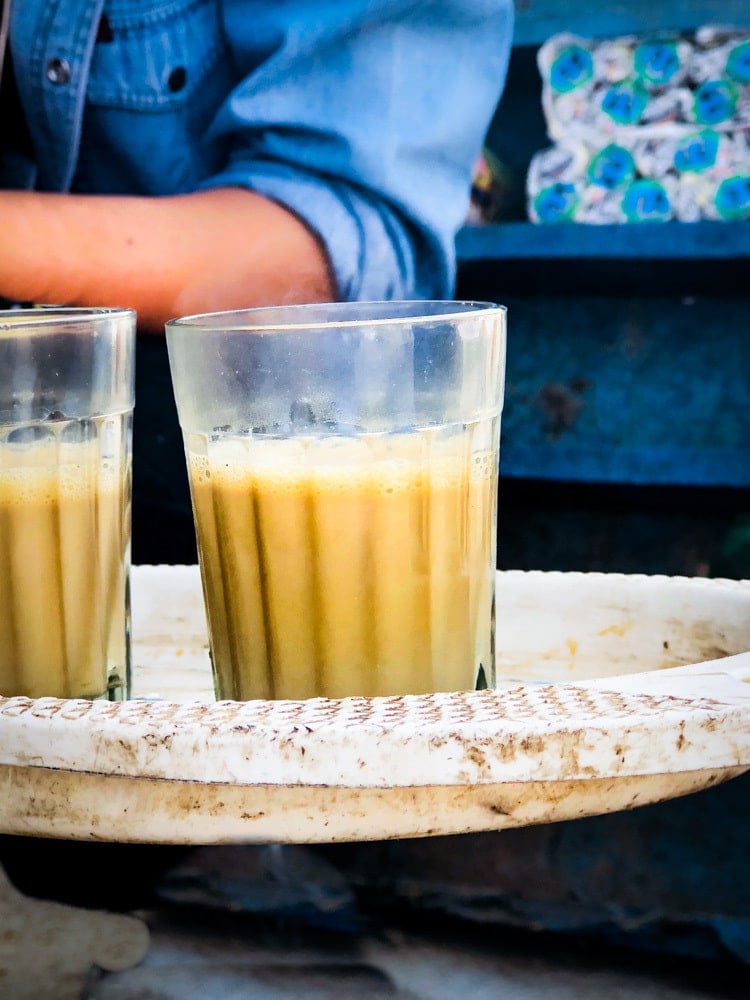
Ingredients in Chai
There are typically four components in Masala Chai and the secret is finding the perfect balance between them.
- Black Tea
- Whole Spices
- Milk (or nut milk)
- Sweetener
What tea do you use for Chai?
- The base of the Masala Chai is typically black tea. Most strong, rich, dark black teas will work well in Masala Chai- something robust enough to hold up to all the flavorful spices. The tea need not be expensive.
- (I prefer to use a high-quality organic, loose black tea that I get in the bulk section of my grocery store. I use about a heaping tablespoon per serving.)
- Assam, Darjeeling is often used in India because they are grown there. Typical brands used are Lipton Yellow Label, and Taj Mahal, and PG Tips. Some households will custom blend their own teas to create their own signature flavor. This can be a very personal thing.
- You can also use 1-2 black tea bags.
- Feel free to use decaf black tea.
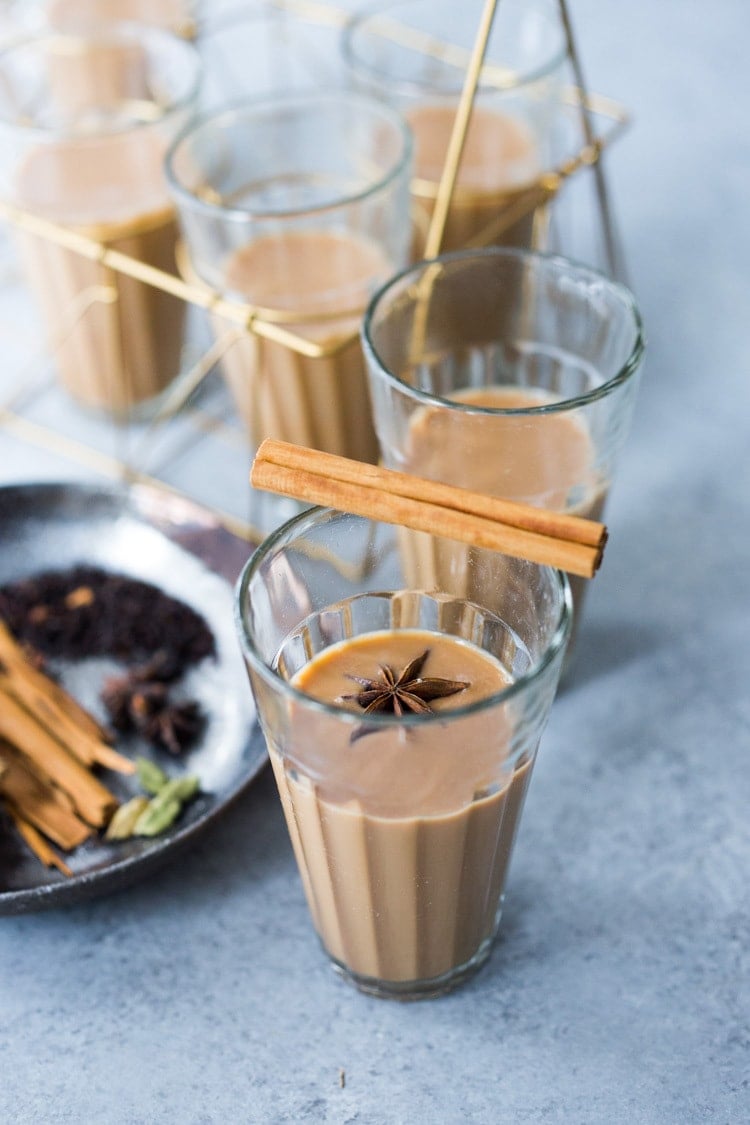
What makes Masala Chai authentic is the use of spices. One thing is for certain, every single person in India probably has their own unique combination of spices they prefer in their masala chai and there is no one “right” way. It is very subjective.
What spices are used in Masala Chai?
Chai Wallahs- the street vendors who make masala chai, all have their own unique blend of chai spices as well- and as you can probably guess, I was obsessed with watching them make their creations.
These are the chai spices I saw used the most in India:
- Fresh ginger
- cardamom pods
- cinnamon
- whole cloves
- peppercorns
- star anise
I especially love the green cardamom pods I picked up in India. So here is a starting point for you but feel free to improvise and fine-tune to your own taste.
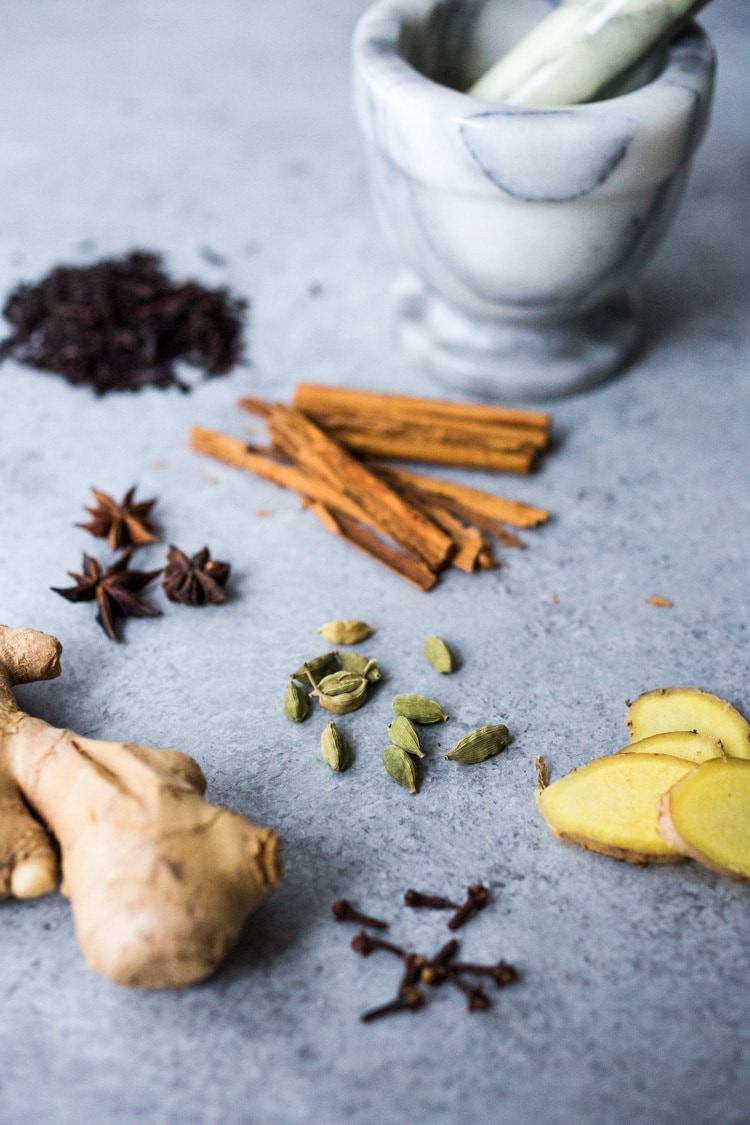
How to make Masala Chai
STEP One: Lightly crush spices.
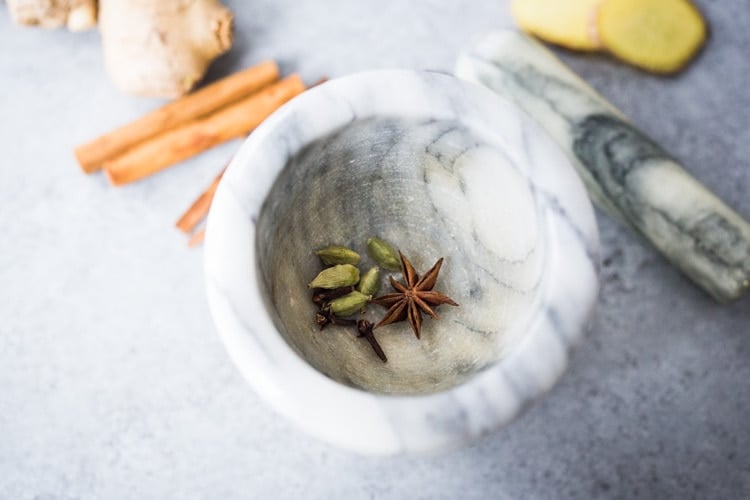
STEP 2: simmer the spices in 1 cup of water for 5 minutes.
STEP 3. Add the tea.
Step 3: Add the Tea.
Then immediately turn off the heat and let it steep for 10 minutes. Boiling the tea will make it bitter, so just bring it to a boil, then turn the heat off.
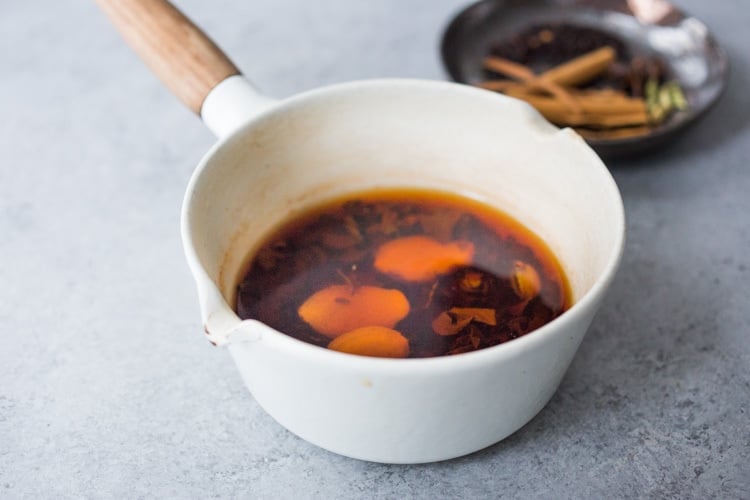
Step 4: Add the milk.
What type of milk to use in Masala Chai?
- In India, whole milk is typically used in Masala Chai.
- For a plant-based chai, try almond milk or oat milk – both work great.
- If you like a rich masala chai- add one full cup of milk. If you like a thinner chai, you can cut the milk with water – for example, 1/2 cup milk, 1/2 cup water.
- So in a nutshell, if you like a richer, thicker tea, use more milk (or even use all milk instead of the water) simmering the spices and tea, right in the milk. Or if you like a lighter masala chai, cut the milk with water. Up to you- a personal preference.
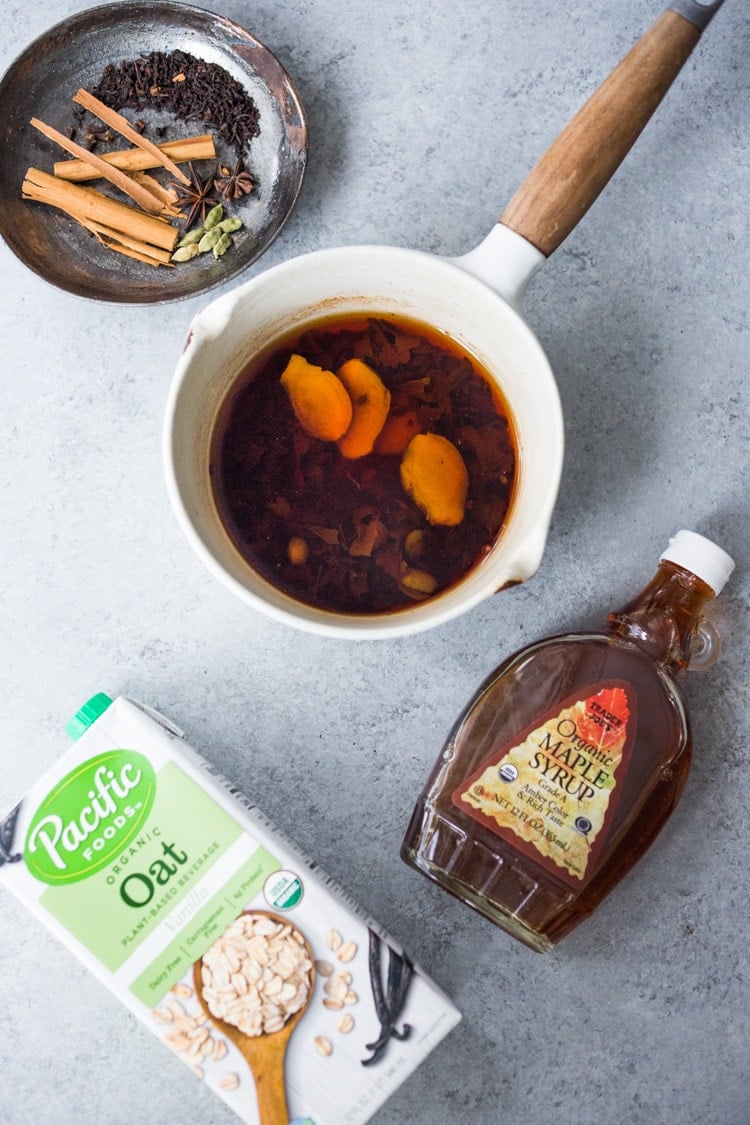
Step 5. Heat and sweeten
Bring the milk and tea just to a boil again, then add sweetener.
How to sweeten Masala Chai:
- The fourth component of Masala Chai is the sweetener. In India, jaggery or cane sugar is typically used.
- I prefer sweetening Masala Chia with maple syrup or honey instead of sugar. But any sugar, or sugar alternative will work here.
- Sweeten to your own taste. For a large 8-ounce serving, I use about 2-3 teaspoons of maple syrup – to balance the spices and black tea. Perhaps this seems a bit much, but to me it tastes perfect.
- Find your own balance 😉 If it tastes overly bitter, it needs more sweetener.

Step 6. Strain and serve.
How to serve Masala Chai
Yes, it is very typical to serve chai in a glass (vs. a mug) in India, leaving some room at the top to hold the glass. But a cozy mug is perfect too.
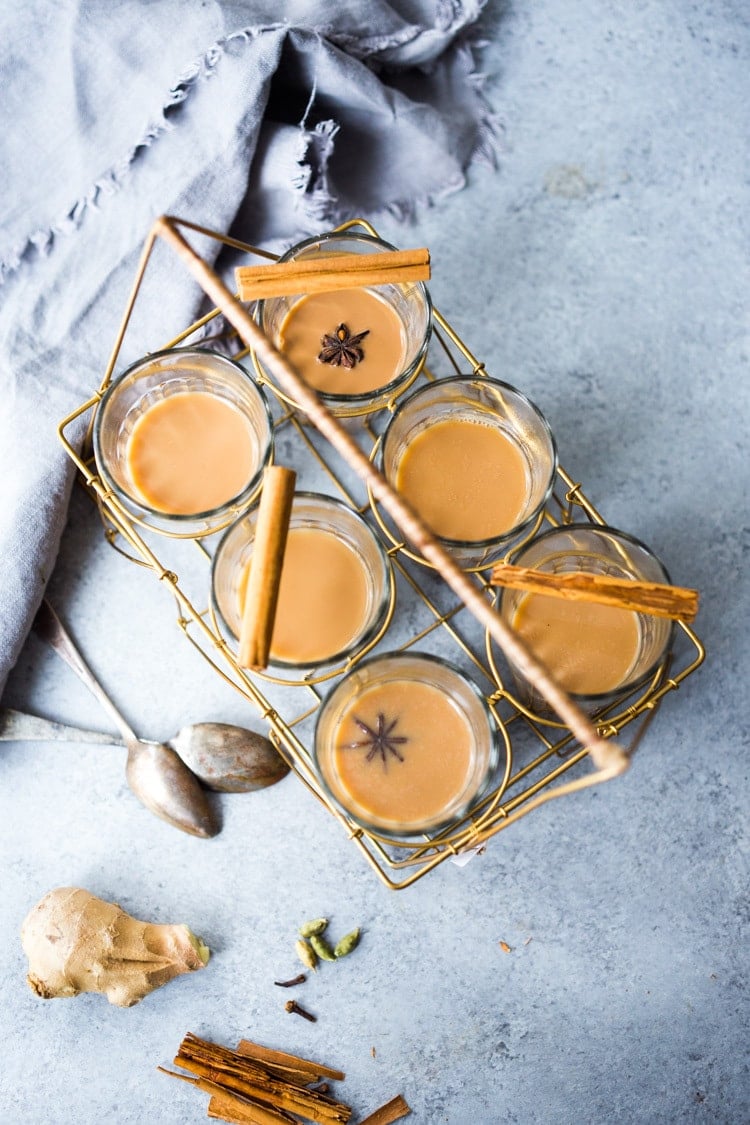
And there you have it, Masala Chai as they make it in India.
A delicious morning beverage or afternoon pick-me-up. I also love this in the evenings with decaf black tea.
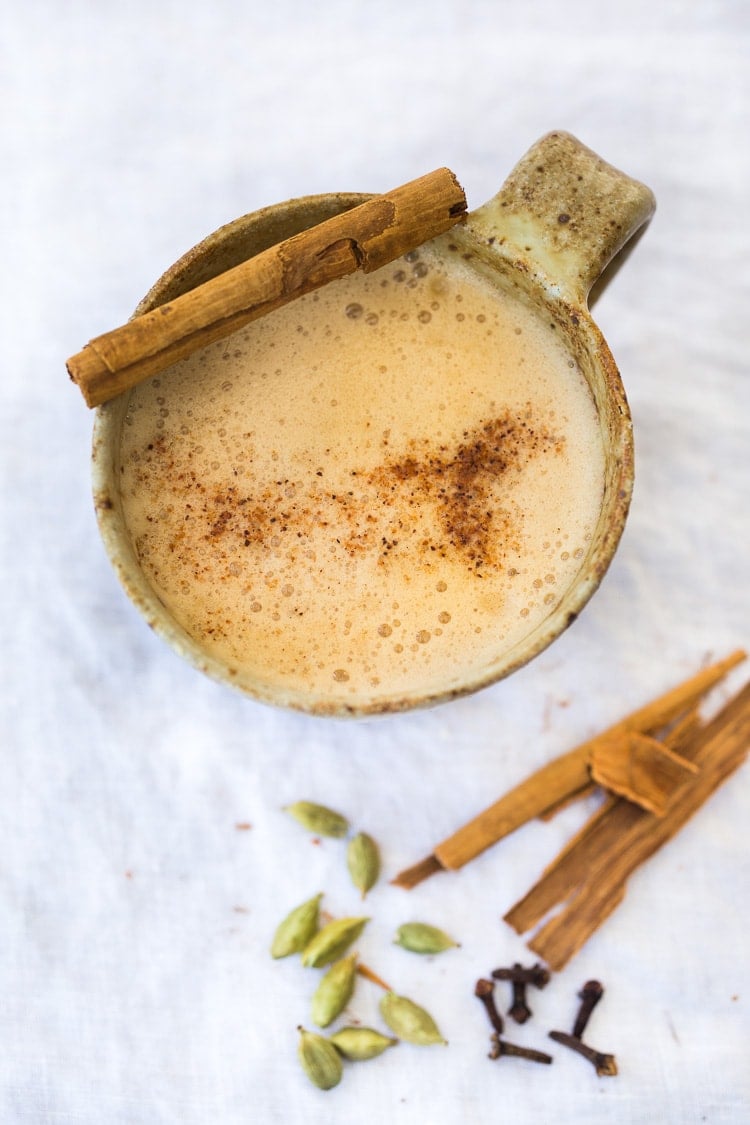
Can Chai Be made ahead?
Feel free to brew a big bath of chai ahead, (leaving out the milk) and store it in the fridge. Then simply pull it out from the fridge and heat it up with the milk.
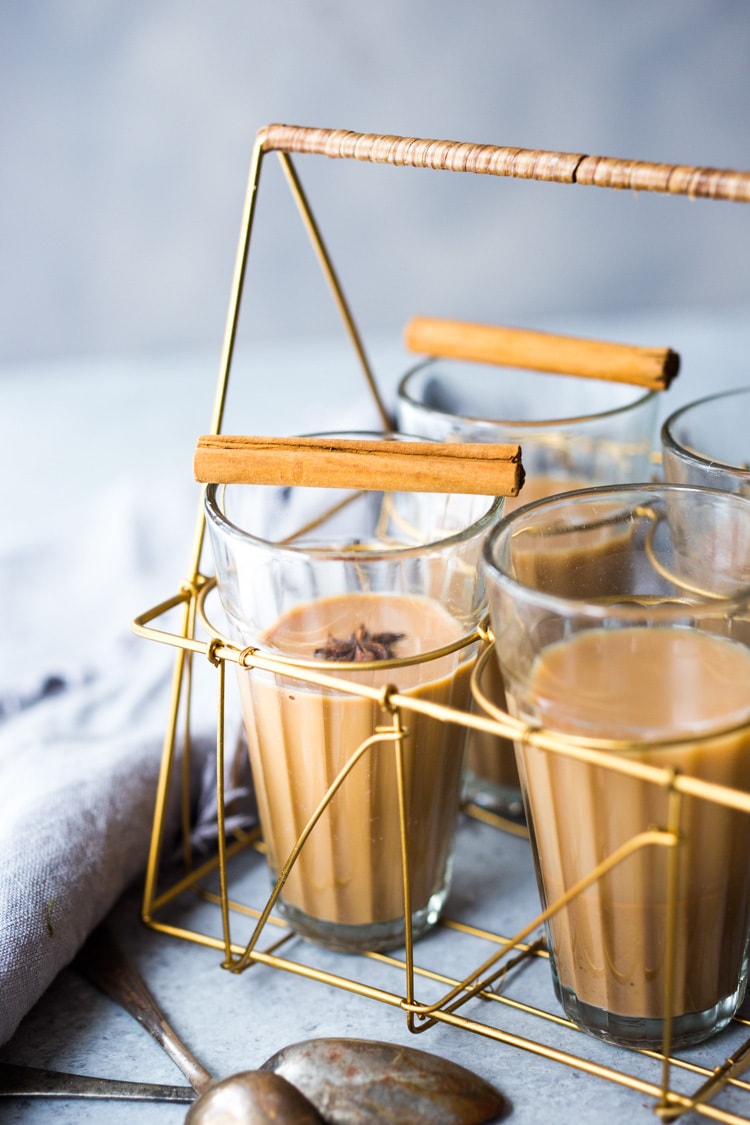
Chai Variations:
During my second visit to India, where we primarily stayed in the North, it was very customary to see chai brewed the same way but with the addition of fresh mint leaves. It was heavenly.
What to serve with Chai
Happy new year friends! May this cozy authentic Masala Chai bring comfort and warmth to help get us all through these cold months.
Love and cheers,
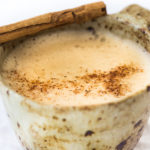
Masala Chai Recipe
- Prep Time: 5
- Cook Time: 15
- Total Time: 20 minutes
- Yield: 1 large mug 1x
- Category: drinks, tea, hot beverage
- Method: stove-top
- Cuisine: Indian
- Diet: Hindu
Description
How to make authentic Masala Chai, like they do in India, using whole spices. Vegan and Sugar-Free adaptable.
Ingredients
- 5–7 green cardamom pods
- 3–4 whole cloves
- 1–2 star anise (optional )
- 5–7 peppercorns (optional)
- 1 cup of water
- 2–3 slices ginger (or more! skins ok)
- 1/2 cinnamon stick– split lengthwise ( use your fingers to separate)
- 1–2 tablespoons loose leaf black tea, (or 1–2 tea bags) Or sub decaf black tea
- 1 cup milk of your choice- organic whole milk, almond milk, oat milk, soy milk, cashew milk, hemp milk ( I like unsweetened, vanilla-flavored almond or oat milk) See notes for “ratio”.
- 2–3 teaspoons (or more or less) maple syrup, honey, sugar or alternative. (Sugar is traditional, but I prefer maple. )
Instructions
- Lightly crush cardamom pods, whole cloves, star anise and peppercorns, and place in a small pot with 1 cup of water. Add ginger and cinnamon. Muddle the ginger a bit right in the pot.
- Bring to a simmer, simmer gently for 5-10 minutes covered, and turn off the heat.
- Add the tea (Do not boil the tea, it can get bitter) and let it steep for at least 5-minutes.
- Add your choice of milk. Bring to a simmer once more, turn off the heat.
- Stir in your choice of sweetener, taste, adding more sweetener to taste. If it tastes bitter, you need more sweetener. Strain into a chai glass or mug.
- Feel the love. xoxo
Notes
TEA: Any dark, rich, robust black tea will work best here. Assam, Darjeeling, etc. You can also make the tea part as strong as you like. Start with one tablespoon loose leaf tea and add more according to your taste. Use loose-leaf or tea bags.
SPICES: Whole spices are preferred here but in a pinch feel free to add or sub ground spices to taste. You can add the ground spices at the end if you like.
MILK RATIO: Instead of the full cup of milk, I typically use a ratio of ½ water and ½ milk. Many prefer the richness of a full cup milk, so feel free to adjust to your taste.
BATCH MAKING: You can make a big batch of the masala chai (without the milk) and refrigerate for up to 4 days, and heat up with the milk and sweetener when ready to serve.
You can add more whole spices and more black tea for an even stronger more concentrated version.
UPDATE: While in Northern India this past month, I had this Chai with the addition of a big handful of fresh mint leaves (simmering in the chai). ABSOLUTELY Delicious! Give it a try!
Nutrition
- Serving Size: 8 ounces – using almond milk and 1 tablespoon maple syrup
- Calories: 103
- Sugar: 12.2 g
- Sodium: 200.9 mg
- Fat: 3.1 g
- Saturated Fat: 0 g
- Carbohydrates: 17.7 g
- Fiber: 1.3 g
- Protein: 1.9 g
- Cholesterol: 0 mg
Keywords: how to make chai, masala chai, masala chai tea, spices in masala chai, chai recipe, authentic chai recipe, spices in chai tea, vegan chai tea, chai latte recipe,
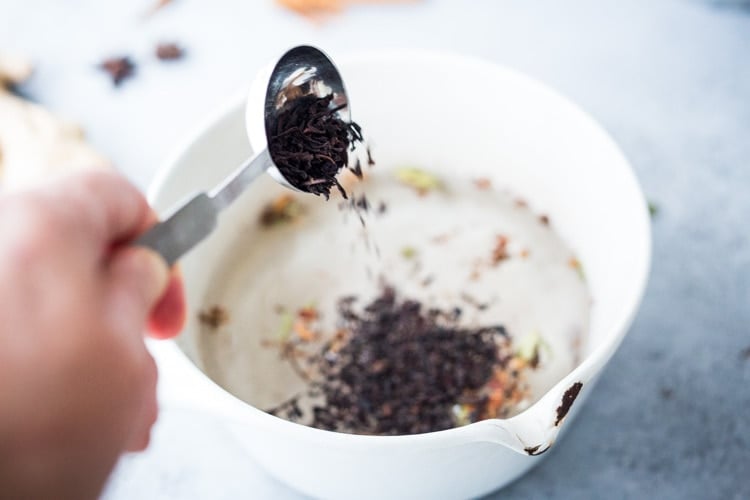
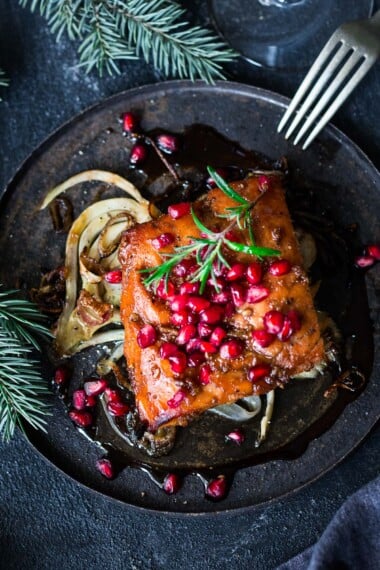
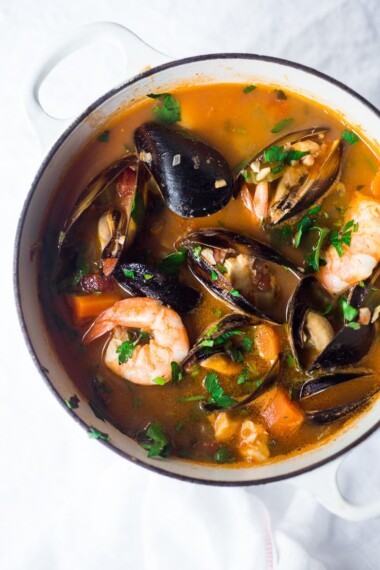
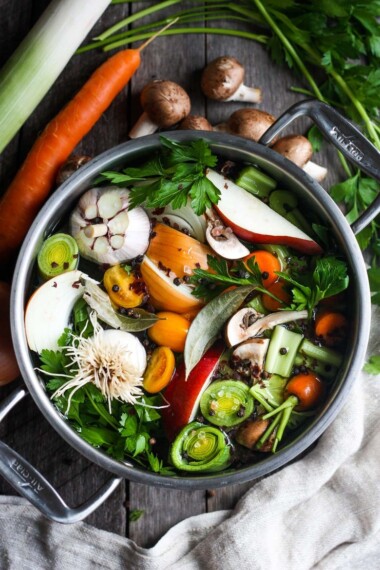
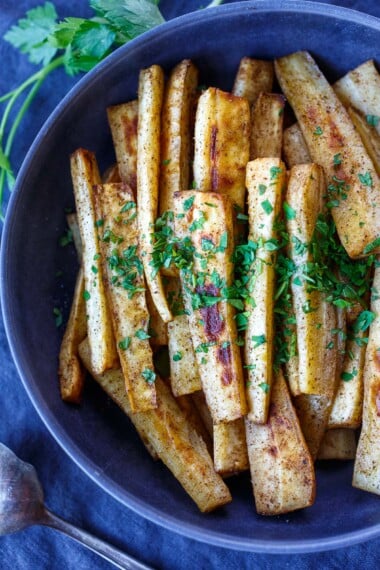
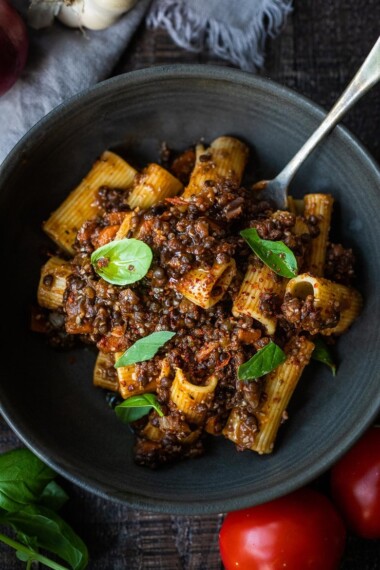
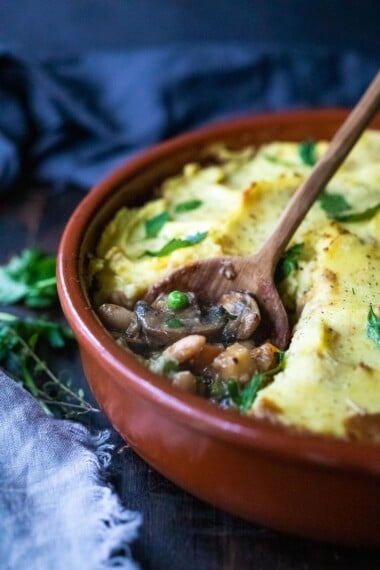
What pot do you use?
This one shown is a vintage sauce pan, but any small sauce pan with a pour spout works great.
LOVED IT!!!
★★★★★
Happy to hear this!
Thank you
You are my favourite read
All your recipes are good and balanced and perFect
You are a blessing in this world
Thank you goodness 🙏🥰❤️
★★★★★
So nice to hear this Chantal! We are honored you are here with us. ❤️
Fab. Like your flexibility re milk/water ratio….and crush or power for spices
★★★★★
Thanks Rose!
Thank you so much for this recipe!! I thought I had to give up Chai when I was diagnosed with diabetes. This version is so much better than any thing I’ve tried before and doesn’t spike my blood sugar. Thank you! Thank you! Thank you! I’m
Oh Debbie so happy to hear this works for you!
I think I’m going to have to try this. I was just looking at masala spice mix today. This tea however as you described has me interested. 😇 Never would of thought masala was used in tea.
★★★★★
Hi Dove! Masala means spice- it is a blend of spices, so it’s not just one type. Just a heads up, Garam Masala would not work well here.
Delicious, soft but very tasty perfect balance in spices
★★★★★
Glad you enjoyed!
Make this all the time. After a trip to India I wanted a recipe for Masala Chai tea. This is delicious. My husband loves it. If you make the spiced tea for later on should you strain or leave the spices in when refrigerating?
★★★★★
Awesome Jane! I leave the spices in so it gets really strong- up to you, if you like it milder, strain. 🙂
The tea is supposed to be boiled for 6 to 8 minutes. Also I am not sure what tea leaves you used I have never seen any like that, it’s best to pick up some from an indian grocery store. The tea leaves and spices are boiled together for 6 to 8 minutes before adding the cup of milk. Otherwise the flavor is very weak and doesn’t taste good or anything like masala tea. I have never seen anyone just steep their tea.
★★
Hi Amy, feel free to boil longer. I find it just makes the tea bitter, and then I need to add more sweetener…but, of course, do as you please!
Thank you Amy!!! The Chai in Varanasi, India was ultra Delicious, I noticed they boiled their tea.
The tea was not too sweet or bitter, it was perfect.
★★★★★
Oh good to hear!
Delicious. One query. You continually say simmer but in your video and others I’ve seen, the Chai Wallah is boiling the heck out of the mixture. Why the difference? Is it to do with our tea (and mine in Australia) is basically powder rather than whole leaves?
So- I noticed that too. 🙂 I think they were boiling it in India so we wouldn’t get sick.
I don’t think that’s quite right. Every house hold give one or two boils. I think there are few reasons besides just not getting sick. Most people in India use whole milk and giving few boils stretches the protein the same way it would when you swirl milk from steam wand on a coffee machine, giving it a silky texture. You would not get the same result if you use say almond milk and/or coconut milk because it’s not the same as whole milk. Chaiwala might not explain it this way but that’s how it’s always been done and some are quite expert at this process. I only recently find out why it tastes different and tried to implement it at home
Ok interesting! I was honestly only guessing. Do you think boiling thickens it?
It does a bit depends on how much milk is used but it’s hard to notice the difference. Also chaiwala continuously stirs the liquid while it’s boiling, that also put some air along with milk getting stretched. I find it so hard to replicate even if they explain step by step, what to do as it’s such a nuanced process. The same way pho broth seems simple but very nuanced.
I think it does thickens a bit but it depends on how much milk is used. Also, I realized most people uses water buffalo milk too in India which also changes a texture. In my experience it’s a bit thicker than even regular whole milk which I would think make a difference. Water buffalo milk is actually cheaper compared to cow milk hence it’s widespread use. There is no way I can get water buffalo milk here in US lol. This process of tea making is certainly way more nuanced than I had anticipated.